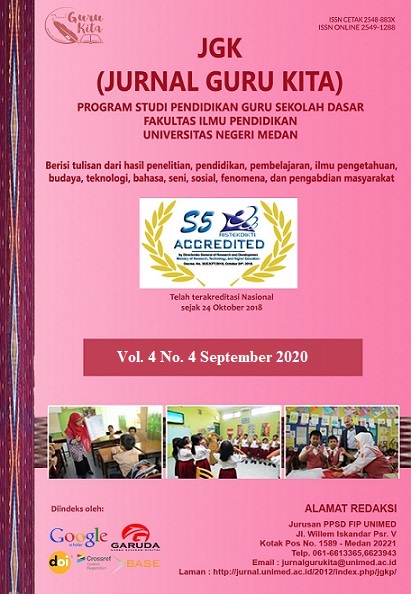EFEKTIVITAS PEMBELAJARAN BAHASA INGGRIS PADA MAHASISWA STAB MAITREYAWIRA PEKANBARU
DOI:
https://doi.org/10.24114/jgk.v7i1.40310Keywords:
English Learning, Effectiveness, Learning achievementAbstract
The Effectiveness of English Learning To Students of Stab Maitreyawira Pekanbaru. The purpose of this study is to describe the effectiveness of ENglish Learning in Maitreyawira STAB students in Pekanbaru. This is a qualitative research. It described the learning achievement process based on: 1) lecturer™s ability; 2) students activity; 3) result (individual and group). The result of this study were: 1) the process of English Learning in Maitreyawira STAB students ran well. The lecturer interesting approach in learning process and students were active; 2) the whole English Learning process was good since it was made based on RPS and the students were active and gave positive response; 3) the evaluation was in normal category since the IPK was 75 which meant the learning process was ˜normal™References
Arikunto Suharsimi. 2006. Prosedur Penelitian Suatu Pendekatan Praktek. Jakarta: Rineka Cipta
Arikunto Suharsimi. 2007. Manajemen Penelitian. Jakarta: Rineka Cipta.
Agung Wicaksono. Efektivitas pembelajaran.
http://Agungprudent.wordpress.com
Deski Diana. Efektivitas pembelajaran matematika dengan pendekatan problem posing. (Malang , universitas negeri Malang, 2007), Skripsi tidak diterbitkan.
Kurniawan Agung. 2005. Transformasi Pelayanan Publik. Jogjakarta. Pembaruan.
Iga Rosalina http://doi.org/10.26740/publika.V2n.p%2p
KBBI https://kbbi.web.id/efektivitas.atauaktivitas.html
Primus Gadu, I Ketut Bagiastra. 2003. Efektivitas Pembelajaran Bahasa Inggris Profesi Pada Mahasiswa Sekolah Tinggi Pariwisata (STP) Mataram Program Studi Diploma Tiga Usaha Perjalanan Wisata http://ejurnal.binawakya.or.id/index.php/MBI
Arif Fathurrahman.Sumardi. Adi E. Yusuf,Sutji Harianto. 2018. Peningkatan Efektivitas Pembelajaran Melalui Peningkatan Kompetensi Pedagogik dan Team Work. https://journal.unpak.ac.id/index.php/JMP/article/view/1334/1153
Downloads
Published
How to Cite
Issue
Section
License
Authors published with the JGK (Jurnal Guru Kita) agree to the following terms:
- Authors retain copyright and grant the journal the right of first publication with the work simultaneously licensed under a Creative Commons Attribution License (CC BY-SA 4.0) that allows others to share the work with an acknowledgment of the work's authorship and initial publication in this journal.
- Authors are able to enter into separate, additional contractual arrangements for the non-exclusive distribution of the journal's published version of the work (e.g., post it to an institutional repository or publish it in a book), with an acknowledgment of its initial publication in this journal.
- Authors are permitted and encouraged to post their work online (e.g., in institutional repositories or on their website) prior to and during the submission process, as it can lead to productive exchanges, as well as earlier and greater citation of published work. (See The Effect of Open Access)













